OWC Mercury Extreme SSD - First Look at a 50GB SandForce Drive
by Anand Lal Shimpi on February 26, 2010 12:00 AM EST- Posted in
- Storage
Overall System Performance using PCMark Vantage
Next up is PCMark Vantage, another system-wide performance suite. For those of you who aren’t familiar with PCMark Vantage, it ends up being the most real-world-like hard drive test I can come up with. It runs things like application launches, file searches, web browsing, contacts searching, video playback, photo editing and other completely mundane but real-world tasks. I’ve described the benchmark in great detail before but if you’d like to read up on what it does in particular, take a look at Futuremark’s whitepaper on the benchmark; it’s not perfect, but it’s good enough to be a member of a comprehensive storage benchmark suite. Any performance impacts here would most likely be reflected in the real world.
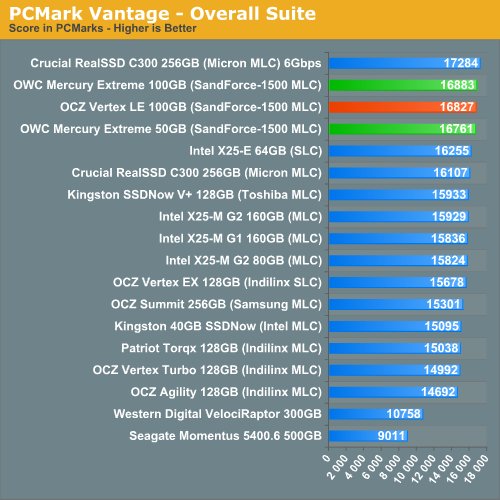
PCMark Vantage mostly echoes what you'd expect based on our data thus far. There's no real performance difference, in the real world, between the 100GB and 50GB SandForce SF-1500 MLC drives. It's only in the HDD specific test that we see any evidence of a slower drive, and even then the drop isn't that great.
The memories suite includes a test involving importing pictures into Windows Photo Gallery and editing them, a fairly benign task that easily falls into the category of being very influenced by disk performance.

The TV and Movies tests focus on on video transcoding which is mostly CPU bound, but one of the tests involves Windows Media Center which tends to be disk bound.
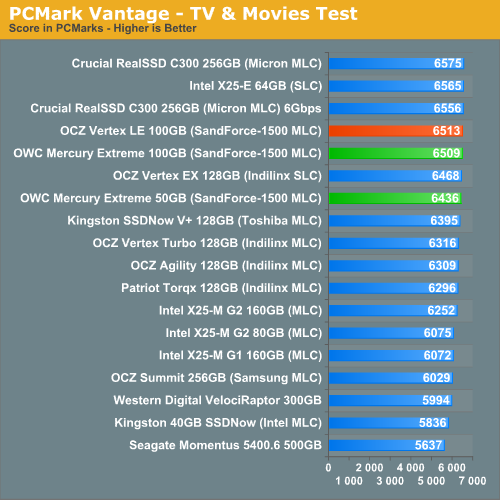
The gaming tests are very well suited to SSDs since they spend a good portion of their time focusing on reading textures and loading level data. All of the SSDs dominate here, but as you'll see later on in my gaming tests the benefits of an SSD really vary depending on the game. Take these results as a best case scenario of what can happen, not the norm.
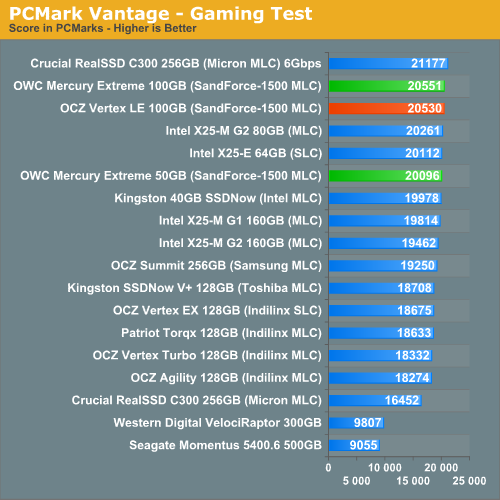
In the Music suite the main test is a multitasking scenario: the test simulates surfing the web in IE7, transcoding an audio file and adding music to Windows Media Player (the most disk intensive portion of the test).
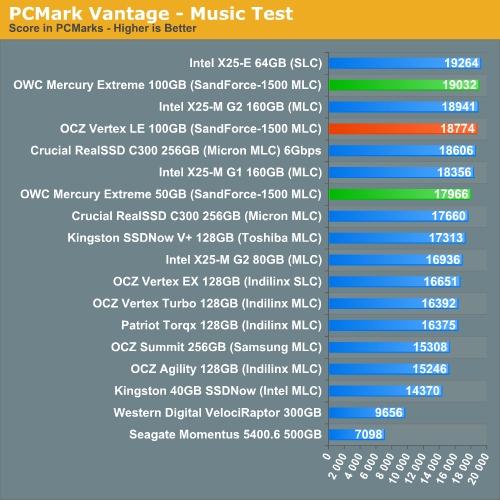
The Communications suite is made up of two tests, both involving light multitasking. The first test simulates data encryption/decryption while running message rules in Windows Mail. The second test simulates web surfing (including opening/closing tabs) in IE7, data decryption and running Windows Defender.
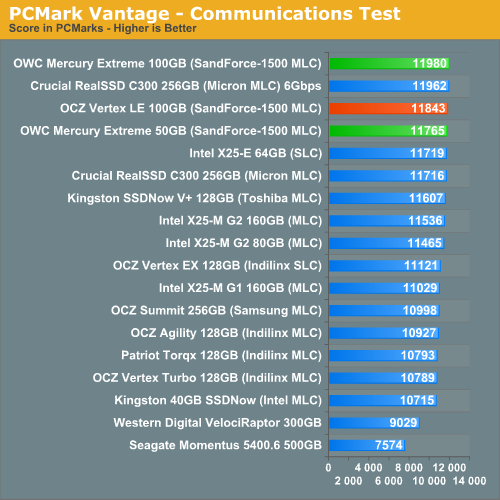
I love PCMark's Productivity test; in this test there are four tasks going on at once, searching through Windows contacts, searching through Windows Mail, browsing multiple webpages in IE7 and loading applications. This is as real world of a scenario as you get and it happens to be representative of one of the most frustrating HDD usage models - trying to do multiple things at once. There's nothing more annoying than trying to launch a simple application while you're doing other things in the background and have the load take forever.
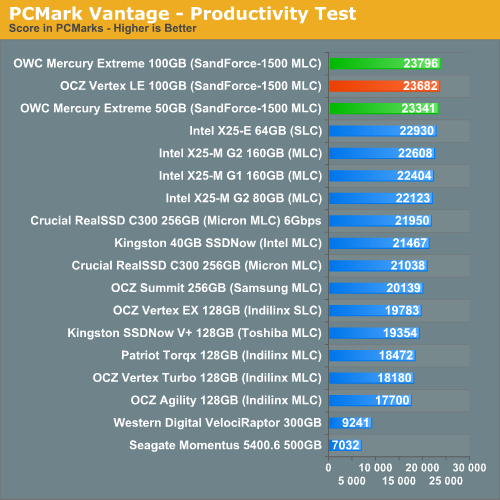
The final PCMark Vantage suite is HDD specific and this is where you'll see the biggest differences between the drives:
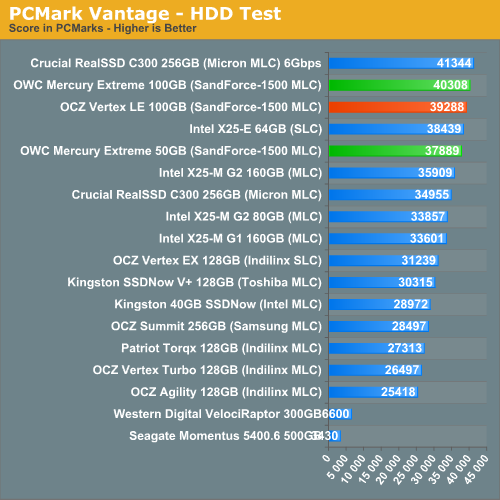










74 Comments
View All Comments
SeanFowler - Friday, February 26, 2010 - link
You mention the performance that's lost on the 50GB platform, which is interesting.As an SSD noob I wasn't aware that performance on smaller drives could be significantly slower than the performance on larger drives of the same series.
I had the 100GB LE on order, then cancelled it to order the C300 as I have Sata3, then found out that the 128GB C300 drive has mediocre write speeds (up to 140MB/s). Talk about a mess!
I see that you and most other sites tend to focus on the largest drives in a series, typically 256GB. Are these really the drives most of your readers are buying though? Based on your LE review and SSD round-up I went for the C300. I can't help thinking that your recommendations would have been very different had you instead tested the 128GB drives. Btw there's more info about the slow write speeds in my comment on the LE article, left earlier today.
I'm now in a bit of a quandry. Do I try to get an LE after all? Will it also have significantly poorer write performance than the 256GB version that everyone's reviewing? Help me Anand Kenobi; you're my only hope!
greenguy - Saturday, February 27, 2010 - link
I bought 3 of the Intel x25-V 40GB drives recently - two for a workstation (mirrored boot drive), and one for my home system. I think that most people who run operating systems other than MS (e.g. Linux, BSD, OpenSolaris) would only really need around the 40-50GB mark. When I look at my Linux system that has been running over a year, the OS and apps part of the drive (i.e. that which benefits from an SSD), it doesn't come anywhere near the 40GB mark.Everything else is media, and even Samsung's 5200RPM HDD is faster than these really need to be. 80MB/s and Bluray's max speed is 7MB/s. As a media drive, most of these will be used write once, read many, and for a read speed of 7MB/s, that's only 500rpm.
Only gamers are going to benefit from larger SSDs, and that's only if they can't be bothered in copying saved game files and settings to the storage drive after deleting whatever games they have gotten sick of. Or simply moving the directory to the storage drive and moving it back when done.
When prices come down again, you can buy more and raid them. This will give nearly double the speed for equivalent cost of buying say, an 80GB drive.
Really, $/GB is a pretty poor metric when evaluating these drives for use as a boot drive. Random 4k read speed/$ is probably the best, with one eye on the random writes (so long as the drive is bigger than say, $30GB).
Of course, this is not the case for laptop drives unless you can fit both a boot and a storage drive in them.
Anand Lal Shimpi - Friday, February 26, 2010 - link
I usually try to review the sweetspot drive, Micron sent out only 256GB drives for review but normally I focus on the ~120GB drives. The LE I tested was a 100GB drive, so you can see where your performance would have been. I'll request a 128GB drive from Crucial right away :)SeanFowler - Friday, February 26, 2010 - link
Thanks Anand; I was forgetting you'd reviewed the 100GB LE rather than the 200GB version. This is probably the one for me to go for then.Another interesting subject is what impact read and write speeds have on the perceived performance of an OS drive. I would expect the read speed to be more important than the write speed as OS drives do more reads than writes.
This could mean that the extra 70MB/s read speed the C300 gives over the LE compensates for the 110MB/s deficit in write speeds.
I could cancel the C300 order and wait to see what's what in a week or so, but by that time the LE's will probably have sold out. The safest option right now seems to be the LE.
Crypticone - Friday, February 26, 2010 - link
I too am not sure what drive to purchase right now. I would really like to see the performance of the C300 in SATA 6gig mode on the Storage Bench. Any chance of running this test? I am interested to see if the faster interface would improve apps and games loading, etc in the real world.Anand Lal Shimpi - Friday, February 26, 2010 - link
6Gbps SATA will only improve large file read performance off of the drive. Loading apps and games shouldn't be any faster. Nearly all high performance SSDs load a single app/game in about the same time.vol7ron - Saturday, February 27, 2010 - link
That might be true presently, but shouldn't that change as apps/games take advantage of more cores while loading and executing?vol7ron
pesos - Friday, February 26, 2010 - link
Very cool! Any plans to let the IT side guys take a crack at these in RAID configurations and let them lose on some database benchmarks?pesos - Friday, February 26, 2010 - link
I meant let them LOOSE of course - they probably wouldn't loseviewwin - Friday, February 26, 2010 - link
When will we hear more about the consumer level controller, SF-1200?